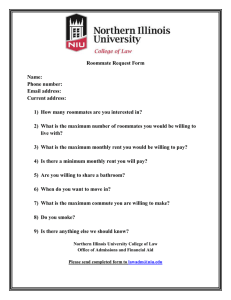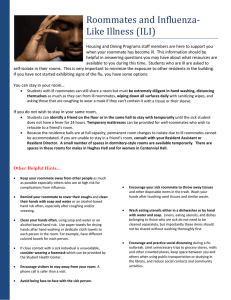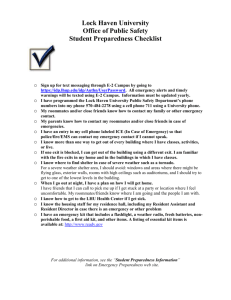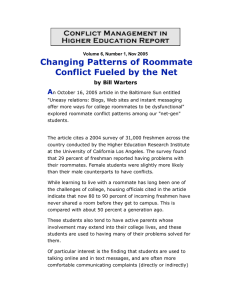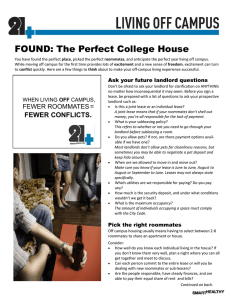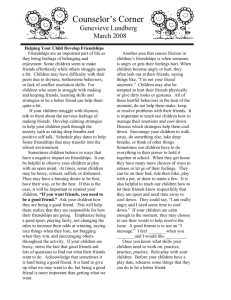Adjustment to university life
advertisement
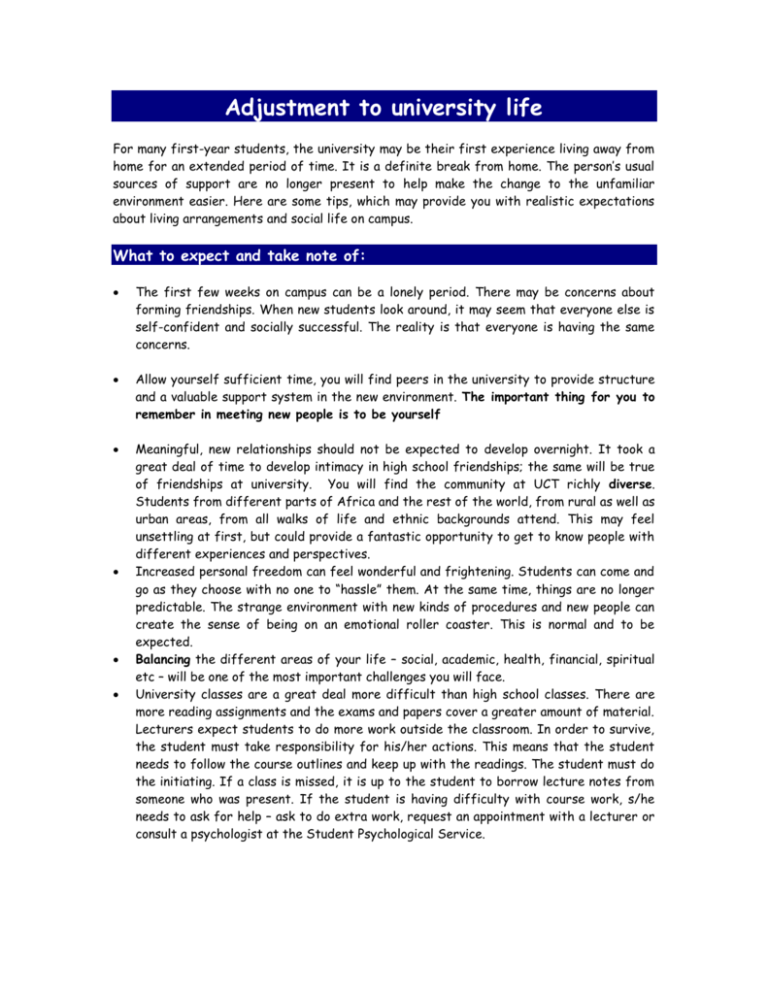
Adjustment to university life For many first-year students, the university may be their first experience living away from home for an extended period of time. It is a definite break from home. The person’s usual sources of support are no longer present to help make the change to the unfamiliar environment easier. Here are some tips, which may provide you with realistic expectations about living arrangements and social life on campus. What to expect and take note of: The first few weeks on campus can be a lonely period. There may be concerns about forming friendships. When new students look around, it may seem that everyone else is self-confident and socially successful. The reality is that everyone is having the same concerns. Allow yourself sufficient time, you will find peers in the university to provide structure and a valuable support system in the new environment. The important thing for you to remember in meeting new people is to be yourself Meaningful, new relationships should not be expected to develop overnight. It took a great deal of time to develop intimacy in high school friendships; the same will be true of friendships at university. You will find the community at UCT richly diverse. Students from different parts of Africa and the rest of the world, from rural as well as urban areas, from all walks of life and ethnic backgrounds attend. This may feel unsettling at first, but could provide a fantastic opportunity to get to know people with different experiences and perspectives. Increased personal freedom can feel wonderful and frightening. Students can come and go as they choose with no one to “hassle” them. At the same time, things are no longer predictable. The strange environment with new kinds of procedures and new people can create the sense of being on an emotional roller coaster. This is normal and to be expected. Balancing the different areas of your life – social, academic, health, financial, spiritual etc – will be one of the most important challenges you will face. University classes are a great deal more difficult than high school classes. There are more reading assignments and the exams and papers cover a greater amount of material. Lecturers expect students to do more work outside the classroom. In order to survive, the student must take responsibility for his/her actions. This means that the student needs to follow the course outlines and keep up with the readings. The student must do the initiating. If a class is missed, it is up to the student to borrow lecture notes from someone who was present. If the student is having difficulty with course work, s/he needs to ask for help – ask to do extra work, request an appointment with a lecturer or consult a psychologist at the Student Psychological Service. Tips on getting along with room/flat mate: University life brings many new experiences. One of the most challenging can be living with someone you know little about. Or perhaps living with someone you know well but have never lived with. Either way, living with anyone in a small space can be a sometimes frustrating, but often, rewarding experience. Generally people believe that when they like each other, living together will be easy. Simply liking someone does not necessarily imply that you can live together successfully. Living together involves something different than liking, it involves being able to talk and share ideas, being tolerant and able to agree on how to handle situations. Living with room/flat mates can present special, sometimes intense, problems. Negotiating respect of personal property, personal space, sleep, and relaxation needs can be a complex task. The complexity increases when roommates are of different ethnic/ cultural backgrounds with very different values. Therefore communicating one’s legitimate needs calmly, listening with respect to a roommate’s concerns, and being willing to compromise to meet each other’s most important needs can promote resolution of issues. It is unrealistic to expect that roommates will be best friends. Roommates may work out mutually satisfying living arrangements, but the reality is that each may tend to have his or her own circle of friends. Living together require certain skills: skills that can be of benefit in any situation in which you need to share space, be it permanent, as in marriage, or temporary, as with roommates. Whenever two people live together there are always both similarities and differences. Inevitably, there need to be compromises, but there is also room for each to learn something valuable from the other. It is not necessary for people to agree on feelings, preferences, or opinions, it is necessary to understand each other and respect each other’s rights. Skills you must have/develop to enjoy your stay with others: Self-knowledge and confidence. If you know yourself, you would be confident enough to share feelings, dislikes and likes personal preferences, habits and characteristicsespecially the “quirks” we all have. You need to share information about your emotional styles so that the roommate can read and understand feelings. Communication skills: to negotiate and identify common areas of conflict including neatness, noise, visits by quest, study arrangements., sharing of belongings, money issues, messages, values, social lifestyles, and schedules. You need to listen to each other with out interrupting, focusing on really understanding how he/she feels. Find us @: Student Wellness Service 28 Rhodes Avenue Mowbray Telephone Numbers: 021 650 1017 021 650 1020 Hours: Mon – Fri 08H30 – 16H30 be informed know the dangers make an informed choice!!
